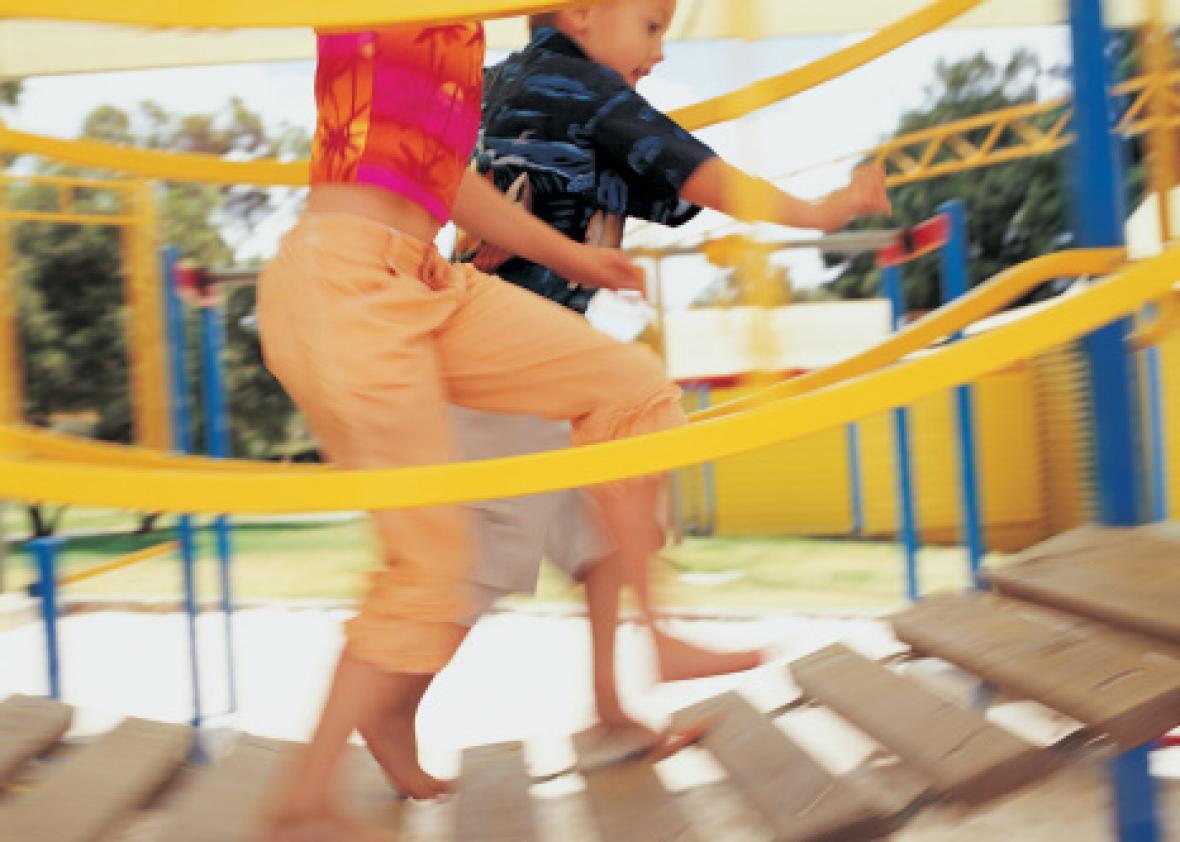Earlier this month, Los Angeles city council member Mitch O’Farrell proposed a law banning adults from playgrounds unless they’re accompanied by children. After hearing complaints from his constituents about drug dealers loitering in local play areas, O’Farrell came up with the plan in order to keep parks “free of creepy activity.” While the ordinance is a long way from becoming law—it still has to be passed by various commissions and committees and then voted on by the city council—it has precedent in other cities. New York, for example, prohibits adults unaccompanied by children from hanging around playgrounds, and adults there have received tickets for eating doughnuts and playing chess in playgrounds.
In a recent editorial, the Los Angeles Times editorial board asks whether such a measure is really necessary, and whether communities might be better served by police enforcing existing laws. The Times takes issue with the assumption the bill is based on: that adults without children near playgrounds are an inherently questionable and “creepy” class of humans. Such logic is an unnecessarily bleak assessment of humanity, and one that ignores the fact that, as free-range parenting advocate Lenore Skenazy points out on her blog, the vast majority of sexually abused children are abused by someone they know. The editorial also points out that because playgrounds are the only type of public space in many areas, limiting their use to families excludes a lot of people who would benefit from them. A 2014 study ranked Los Angeles 45th out of 60 U.S. cities in terms of park size, accessibility, and spending and found that 1.8 million Angelenos live more than a 10-minute walk from public green space.
It’s not just people without children who lose when childless adults are banned from playgrounds—families suffer, too. As Sarah Menkedick wrote in an essay for Vela earlier this year, the playground is a symbol of the way we isolate parents from society at large. They are spaces “designed exclusively for children, with no functional purpose other than children’s scientifically delineated and cultivated development.” She acknowledges that they facilitate play, and that play is important, but is saddened and frustrated by the way this play takes place apart from everything else. Menkedick points to an interview with anthropologist David Lancy, in which he describes the U.S. as a “neontocracy,” or society in which the youngest members are most valued and consequently have special spaces reserved exclusively for their use.
This segregation has its pros and cons for children. They’re provided with a relatively safe environment in which they can explore and take risks. But in the process, they’re denied exposure to the wider, messier all-ages world, which would likely broaden their perspective, offer challenges more like what they’ll experience later in life, and spark their imaginations.
For adults, this segregation leans more towards the terrible. Yes, it’s nice to be able to open and close a heavy gate and let one’s children run around without having to worry too much about them. (Of course, many parents still do, waiting to meet their children at the end of every trip down the slide, and refereeing each and every inter-toddler spat.) But ultimately, a life spent inside playgrounds is a fairly lonely one, particularly for parents who didn’t want parenthood to be such a sharp departure from their former lives. Menkedick compares her experience raising her daughter in Mexico, where children are more integrated into adult life, to the more child-segregated, and ultimately lonely, existence she encountered when moving to Pittsburgh:
It is a loneliness exacerbated by parenthood, when so much time is spent in spaces exclusively for children, and when time spent in adult spaces seems conspicuously constructed around children’s absence. It is the loneliness of a life that allows little room for contradiction, for conflicting identities and selves … The loneliness contains at its core two desires: one for more overlap, of the childfree and parents, of public and private, of the functions and uses of space; the other for unpredictability … for a glorious defection from the demands of place and time—a prospect both exhilarating and terrifying to parents.
I found great comfort in these words, which diagnosed an ailment that I had yet to fully realize I was suffering from. The integration of public spaces for children with public spaces for adults can’t alone fix the severe before-and-afterness of having kids in the United States, but it’s certainly something we should be working towards rather than against.
